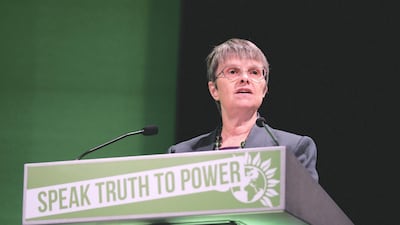Last week at the European Parliament, Robert Rowland of the UK Brexit Party stood up to ask a question of Molly Scott Cato of the UK’s Green Party.
Mr Rowland questioned Ms Cato’s comment on the economic impact of Brexit: "As far as I am aware, she does not have any degree in economics or maybe she has some business experience that will give some empirical proof that would be the case.”
His intention was clear: to undermine what Ms Cato had said. She replied: "Obviously you haven't been paying much attention to my CV because I was and I remain a professor of economics." She delivered the lines calmly, clearly and with poise, asserting her expertise. The audience clapped and rippled with laughter.
Mr Rowland on the other hand squirmed in his seat. The perfect bookend to this incident came from the female chair of the session and vice president of the European Parliament, Mairead McGuinness, who pointed out: "I think Mr Rowland stands corrected."
But this is not about party politics. It is about gender and the ways in which women’s voices are challenged and silenced.
Mr Rowland’s approach is known as mansplaining – to explain something to a woman in a way that assumes she has no knowledge about the topic.
While mansplaining might be considered a cutesy if irritating amalgam term, it highlights a serious problem. The phenomenon was first described by the writer Rebecca Solnit in her 2008 essay, Men Explain Things to Me. Solnit spoke of an incident when a man wrongly explained to her and her friend a book that he had never read. It turns out, Solnit was the author of the book.
Similarly, Ms Cato’s assertion of her credentials was the perfect response. The video clip of her comeback resonated with women everywhere and has been widely shared. Women who have being silenced are often told they are imagining it. Such gaslighting is another tactic to undermine their voices.
Women should always state their expertise without embarrassment. But it is drummed into them that this is bragging. Ultimately, it is a trap: not enough expertise and they are dismissed, too much expertise and they are bragging.
When women are angry or upset – as men routinely are too – they are shut down for being too emotional. Rather than inquiring about the reasons for the anger, they are often labelled hysterical.
Take the case last week of Fiona Hill testifying at the impeachment hearings in the US. The former senior director for Russia and Europe at the National Security Council was asked about meetings she had had with the US ambassador to the EU, Gordon Sondland. Ms Hill outlined how Mr Sondland had not been properly co-ordinating with her. "I was actually, to be honest, angry with him. I hate to say it but often when women show anger, it's not fully appreciated. It's often, you know, pushed onto emotional issues perhaps, or deflected onto other people." Mr Sondland ought to have given more credit to her expertise and considered why she was angry. Ms Hill rightly pointed out "this is all going to blow up." If only they had not dismissed a woman because she was angry.

The notion that women will no longer be likeable if they speak up, especially if they make men uncomfortable is pervasive. Which is why watching Mr Rowland be corrected was gratifying. Sometimes it is an actual physical exclusion, such as the scourge of manels or all male panels. Of course, not all men talk over women or undermine them. But studies show that women are interrupted more than men. Men talk more than women in business meetings. They make up more commentators, politicians, journalists, authors and filmmakers and yet women are perceived as talking more and taking up too much space.
In 2017, a study from George Washington University found that men interrupted 33 per cent more often when they spoke with women rather than other men. This happens even at the most senior levels. Tonja Jacobi a professor at Pritzker School of Law at Northwestern University in Chicago analysed the conversations between Supreme Court judges and found that over a twelve year period, female judges were three times more likely to be interrupted by male judges.
A similar bias was reported in another piece of research. A University of Nevada study looked at the front page stories on the New York Times and found that Times' reporters quoted 3.4 times as many male sources as female sources. While the study was conducted back in 2013, the problem persists. In the same vein, a University of Illinois study published in The International Journal of Press/Politics found that male political reporters were three times more likely to retweet male colleagues than female ones.
As both Ms Cato and Ms Hill have shown, women have every right to be heard. And watching them calmly assert their credentials is beautiful. I hope more women take courage from them and do the same.
Shelina Janmohamed is the author of Love in a Headscarf and Generation M: Young Muslims Changing the World


